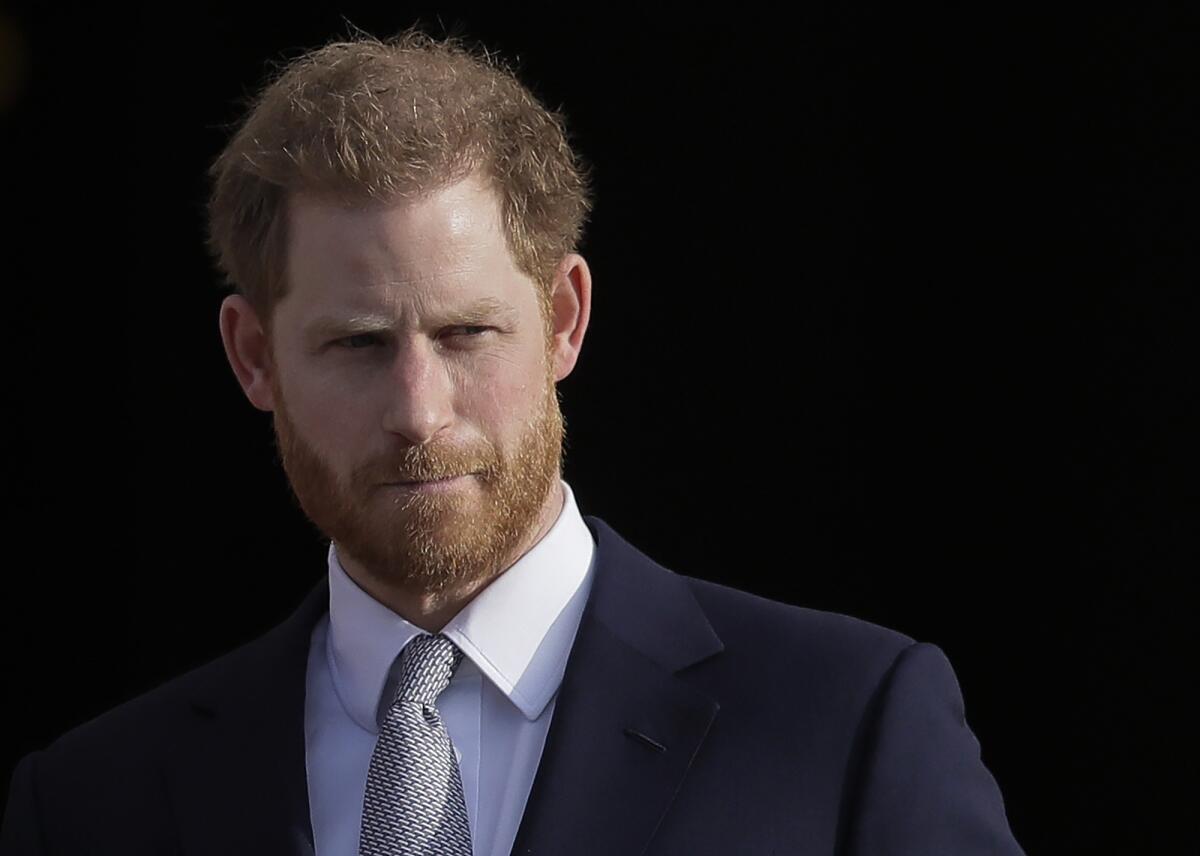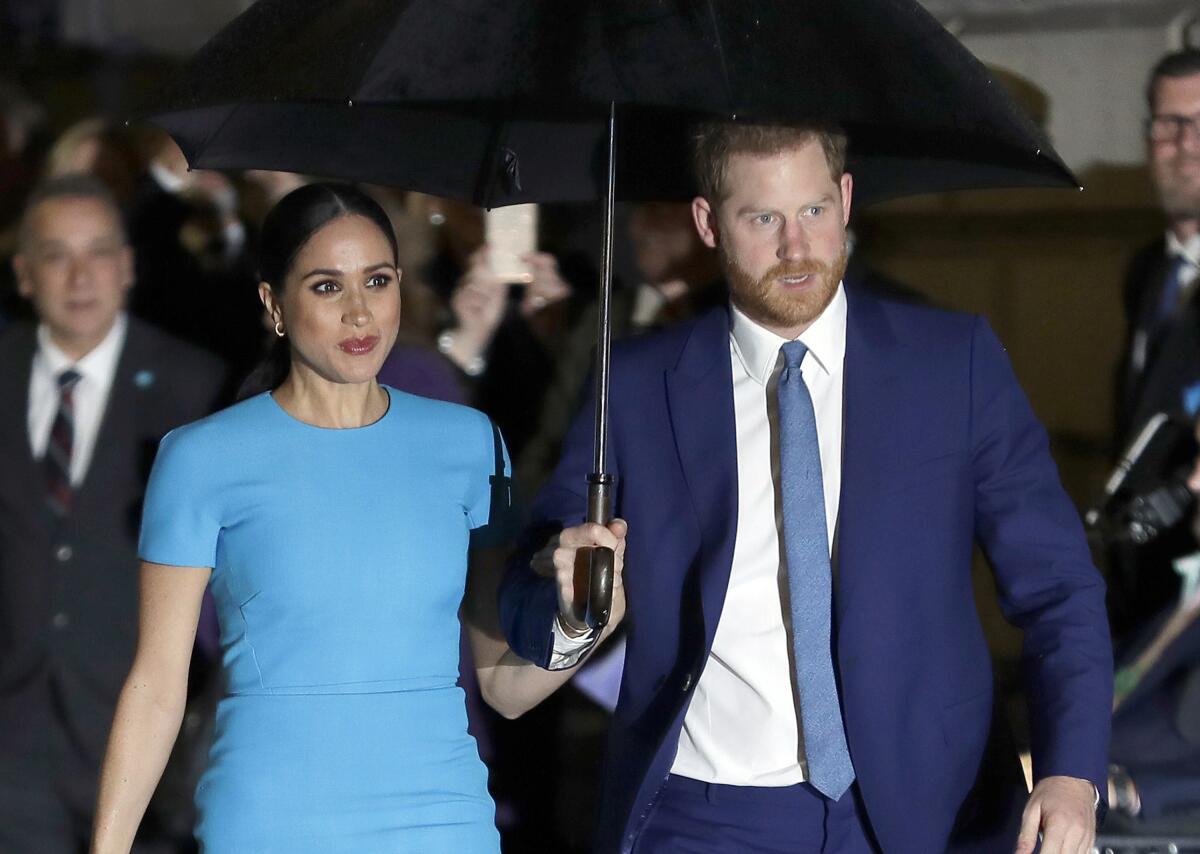Prince Harry trash-talks royal life: He knew in his 20s he didn’t want any part of it

- Share via
“I’ve seen behind the curtain, I’ve seen the business model; I know how this operation runs. ... I don’t want to be part of this.”
That’s what Prince Harry, Duke of Sussex, said he felt about life as a royal when he was in his 20s.
Harry went on the Thursday episode of Dax Shepard’s podcast, “Armchair Expert,” to promote his upcoming Apple TV+ mental health documentary series, “The Me You Can’t See” (cocreated and executive produced with Oprah Winfrey). Along the way, he addressed his ambivalence toward being part of “the Firm.”
The son of Prince Charles and the late Princess Diana said that in his 20s, he didn’t want the job: “Look what it did to my mum,” he said. “How am I ever going to settle down and have a wife and family, when I know it’s going to happen again?”
Harry added, “Once I started doing therapy, it was like suddenly the bubble was burst. I plucked my head out of the sand, gave it a good shake-off. ... ‘Stop thinking as though you want something different; make this different.’
“‘So how are you going to do this differently? How are you going to make your mum proud?’”
Speaking with Shepard and cohost Monica Padman for about 80 minutes, the husband of Meghan, Duchess of Sussex, talked about the equalizing effect of serving in the military (he flew a helicopter during two tours in Afghanistan), his ongoing issues with the paparazzi and the benefits he has reaped from therapy.
“I didn’t acknowledge that, clearly, what happened to me when I was 12 years old, losing my mum and all the other pieces that happened, the traumatic experiences that happened to me since then, I didn’t acknowledge that perhaps I need to deal with this,” Harry said. “I need to process this because if I don’t, how the hell am I going to be a decent father to my son and my daughter?”
When Shepard asked what the moment was that led to therapy, Harry responded, “It was a moment with my now-wife. She saw it, she saw it straightaway. She could tell that I was hurting and that some of the stuff that was out of my control was making me really angry. It would make my blood boil.”
He said feelings of helplessness triggered his anger response, citing three instances: “One, when I was a kid in the back of the car with my mum, being chased by paparazzi. Two was in Afghanistan, in an Apache helicopter. And then the third one was with my wife. ... Yeah, feeling helpless hurts. It really hurts.”

Shepard compared the level of scrutiny the royal family lives under to the Peter Weir film “The Truman Show,” in which every moment of a man’s life is broadcast without his knowledge or consent.
“Yup, a mix between ‘The Truman Show’ and being in a zoo,” said Harry.
He said his young family’s initial move to the Los Angeles area didn’t ease that part: “It’s a feeding frenzy here. We spent the first three and a half months living at Tyler Perry’s house. And the helicopters, the drones, the paparazzi climbing the fence; it was madness.”
Harry, of course, has coped with paparazzi his whole life; his mother, Princess Diana, died with paparazzi in pursuit.
Lightening the mood, Shepard asked Harry if he watched movies to learn about “non-royal life,” such as going to the grocery store; Harry said he had been shopping with his mother but “every time we came out, we got pounced on. There was literally very rarely a day that went by without one paparazzi jumping out from behind a car or something.
“The first time Meghan and I met up for her to come and stay with me, we met up in a supermarket in London, pretending that we didn’t know each other, texting each other from the other side of the aisle. … ‘Is this the right one?’ ‘No, you want parchment paper.’”
Still, he said, now that his family has settled in Montecito, a bit up the coast from L.A., they feel better. “My shoulders have dropped. So’s hers. We can walk around feeling a little more free. I can take [my son] Archie on the back of my bicycle. … I never had a chance to do that.”
More to Read
The biggest entertainment stories
Get our big stories about Hollywood, film, television, music, arts, culture and more right in your inbox as soon as they publish.
You may occasionally receive promotional content from the Los Angeles Times.











